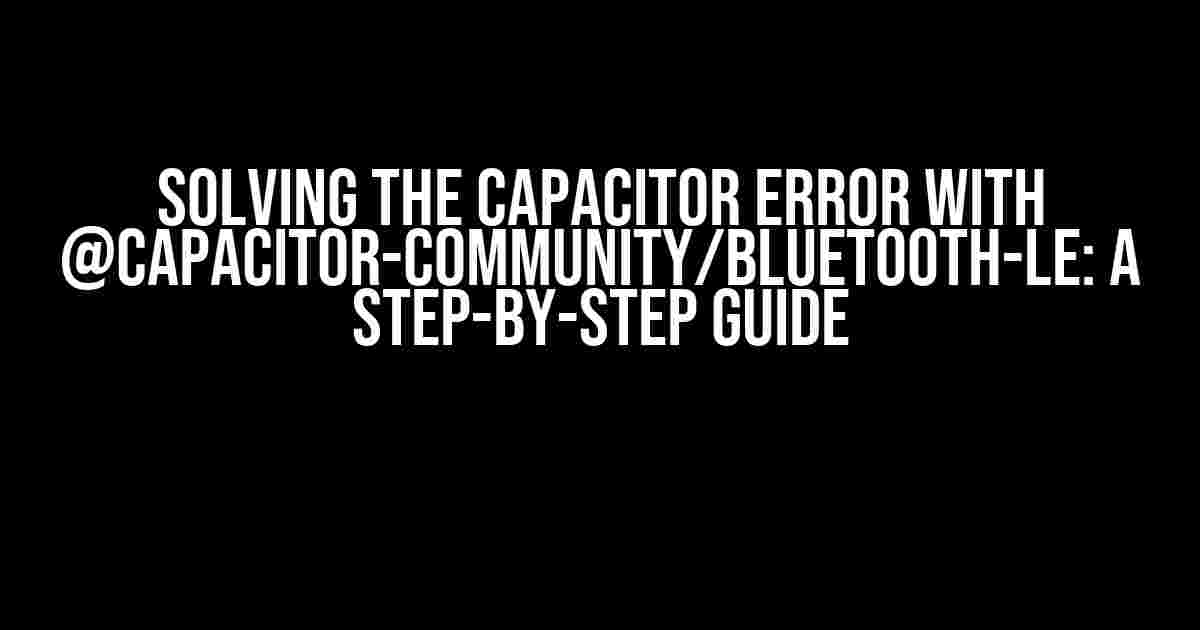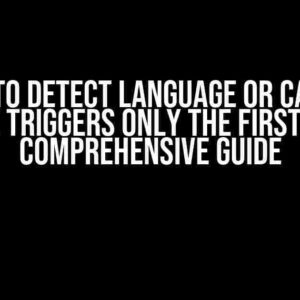Are you tired of encountering the frustrating capacitor error with @capacitor-community/bluetooth-le? Don’t worry; you’re not alone! In this article, we’ll take you on a journey to debug and fix this pesky issue, ensuring your Bluetooth Low Energy (BLE) app runs smoothly using Capacitor.
Understanding the Error
The capacitor error with @capacitor-community/bluetooth-le typically occurs when there’s a mismatch between the plugin’s version and the Capacitor version. This can lead to a series of issues, including:
- Plugin initialization failures
- BLE connection drops
- Inconsistent device discovery
Before we dive into the solutions, let’s understand the root cause of this error.
The Culprits: Version Incompatibilities
The @capacitor-community/bluetooth-le plugin relies on specific Capacitor versions to function correctly. When you update Capacitor, the plugin might not be compatible with the new version, causing the error.
To identify the incompatible versions, check your project’s package.json file:
{
"dependencies": {
"@capacitor/core": "~3.3.2",
"@capacitor-community/bluetooth-le": "^2.1.1"
}
}
In this example, the @capacitor-community/bluetooth-le plugin version (2.1.1) might not be compatible with the Capacitor version (3.3.2).
Step 1: Update the Plugin Version
To resolve the version incompatibility, update the @capacitor-community/bluetooth-le plugin to the latest version compatible with your Capacitor version:
Run the following command in your project directory:
npm install @capacitor-community/bluetooth-le@latestThis will update the plugin to the latest version. You can verify the updated version in your package.json file:
{
"dependencies": {
"@capacitor/core": "~3.3.2",
"@capacitor-community/bluetooth-le": "^2.3.0"
}
}
Step 2: Rebuild the Capacitor Plugin
After updating the plugin, rebuild the Capacitor plugin to ensure the changes take effect:
Run the following command in your project directory:
npx cap syncThis command will rebuild the Capacitor plugin, ensuring the updated plugin version is reflected in your project.
Step 3: Verify Plugin Compatibility
To confirm the plugin compatibility, check the plugin’s status in your project:
Run the following command in your project directory:
npx cap plugin:info bluetooth-leThis command will display the plugin’s status, including its version and compatibility information. Verify that the plugin version matches the one you updated in Step 1.
Additional Troubleshooting Steps
If you’re still experiencing issues, try the following additional troubleshooting steps:
-
Delete the
node_modulesdirectory and runnpm installagain:rm -rf node_modules && npm install -
Clear the Capacitor cache:
npx cap cache clear -
Verify that your project’s
capacitor.config.jsfile is correctly configured:module.exports = { // ... other configurations ... plugins: [ { name: 'BluetoothLE', plugins: ['@capacitor-community/bluetooth-le'] } ] };
Common Issues and Solutions
Here are some common issues you might encounter and their solutions:
| Issue | Solution |
|---|---|
| Plugin initialization failure | Check that the plugin is correctly installed and configured in your capacitor.config.js file. |
| BLE connection drops | Verify that your device is properly paired with the BLE device and that the plugin is correctly configured. |
| Inconsistent device discovery | Check that the plugin’s version is compatible with your Capacitor version and that the plugin is correctly configured. |
Conclusion
By following these steps, you should be able to resolve the capacitor error with @capacitor-community/bluetooth-le and get your BLE app up and running smoothly using Capacitor. Remember to regularly update your plugin versions and verify compatibility to avoid similar issues in the future.
Happy coding!
Frequently Asked Question
Got stuck with capacitor error using @capacitor-community/bluetooth-le? We’ve got you covered! Here are some frequently asked questions to help you troubleshoot the issue.
What is the most common reason for capacitor error with @capacitor-community/bluetooth-le?
The most common reason for capacitor error with @capacitor-community/bluetooth-le is incorrect plugin installation or configuration. Make sure to follow the official documentation for installing and configuring the plugin, and double-check that you’ve imported the plugin correctly in your code.
How do I fix the “Failed to add the plugin” error when using @capacitor-community/bluetooth-le?
To fix the “Failed to add the plugin” error, try deleting the `node_modules` directory and running `npm install` or `yarn install` again to reinstall the dependencies. If the issue persists, try cleaning and rebuilding the capacitor project using the command `npx cap sync` and then `npx cap build`.
Why am I getting a “Bluetooth LE is not supported on this platform” error?
This error occurs when you’re trying to run the app on a platform that doesn’t support Bluetooth LE, such as a desktop browser. To fix this, ensure that you’re running the app on a mobile device or emulator that supports Bluetooth LE, and that you’ve configured the capacitor project correctly for mobile builds.
How do I troubleshoot Bluetooth LE connection issues with @capacitor-community/bluetooth-le?
To troubleshoot Bluetooth LE connection issues, first ensure that Bluetooth is enabled on the device and that the device is in range of the BLE peripheral. Then, check the plugin logs for errors or warnings, and try using the `BLE.debug` method to enable debug logging. Finally, try resetting the BLE plugin using the `BLE.reset()` method and then reconnecting to the peripheral.
Where can I find more resources and support for @capacitor-community/bluetooth-le?
For more resources and support, check out the official @capacitor-community/bluetooth-le documentation, GitHub issues, and Ionic Forum. You can also join the Ionic Community Slack channel to connect with other developers and get help from the community.







